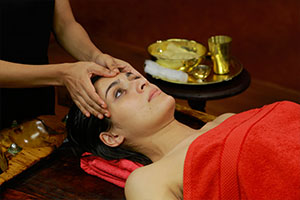Restore and rejuvenate post childbirth with Ayurveda
With families becoming nuclear and busy, the support system required for the awareness and services of the new mother and her just-born is sparse. There is a difference in the care when you have delivered through operative Caesarean section or normal delivery.
What is the postnatal period and how long does it last? 6 weeks to 6 months
 The first 6 weeks is the active care given to the new mother that focusses on restoring the mother’s physiology and psychology that have been exhausted during pregnancy and delivery and prepare her to take care of herself and her new-born. This will also include ensuring adequate lactation, the repositioning of the uterus back to its pre-pregnant state, preventing the physical and mental stress in the mother. The following next 4 to 5 months is a rehabilitator period that emphasizes on the strengthening the abdominal muscles, and ligaments, restoring the nutrient resources that have been spent during pregnancy.
The first 6 weeks is the active care given to the new mother that focusses on restoring the mother’s physiology and psychology that have been exhausted during pregnancy and delivery and prepare her to take care of herself and her new-born. This will also include ensuring adequate lactation, the repositioning of the uterus back to its pre-pregnant state, preventing the physical and mental stress in the mother. The following next 4 to 5 months is a rehabilitator period that emphasizes on the strengthening the abdominal muscles, and ligaments, restoring the nutrient resources that have been spent during pregnancy.
Aims of Ayurvedic Postnatal Care
- To re-establish the digestive and metabolic state (Agni) of the body.
- Normalize the physiological functions and strengthening of the lax muscles and ligaments
- Ensure good quantity and quality of breast milk
- Recommendation of diet and lifestyle that are apt for the mother
Postnatal Care Diet
- Palatable foods of liquid or semisolid consistency inclusive of all 6 tastes should be preferred.
- Hydration needs to be ensured by drinking a good amount of warm water, cumin water, coconut water, and fresh fruit juice.
- Fresh foods that are easy to digest with ghee and mild spices are recommended.
- Warm milk with ghee is supportive of good lactation, ensuring sleep, and promotes breast milk secretion.
- Include fresh fruits like gooseberry, pomegranate, and banana with raisins, dates, and figs. Prioritize the local and seasonal fruits. You really don’t need to spend high on imported foods to have better health.
- Avoid eating raw sprouts, vegetables, and greens. They can be cooked by steam or stir-fry, seasoned with spices like pepper/ ginger powder and rock salt, and then be consumed.
Lifestyle for Postnatal Care
- Rest is your best friend. Do not exert during the first week following a normal delivery and two weeks following operative delivery.
- Oil massage when it is recommended for you. (Postnatal ayurvedic massage)
- Keep yourself warm.
- Take a sitz bath following vaginal delivery.
- Feed your baby frequently and express the extra breast milk.
- Adopt good hygiene practices to ensure optimal breast and genital health. This does not require vaginal washes or wipes. Just wash with regular soap and warm water and pat dry completely.
- Adopt walking and follow mild exercises. This not only helps to improve circulation and passing of bowels, but it also keeps you in a better state of mind.
- When you are feeling helpless or anxious don’t hesitate to ask for help.
Consult an Ayurvedic doctor before you embark on Ayurvedic Postnatal Care. Why?

The prakruti (body constitution) is unique to every individual. And the journey through pregnancy and childbirth is a different experience for every woman, and even in the same woman, there will be differences in each birth.
Thus a common approach to post-natal care for every new mother will not be very beneficial. The choice of internal medicines, oils for massage, spices, and food to be included in your diet are very specific to your body. And the care is different depending on the type of delivery.
It is also good to be under medical guidance while taking herbs like Shatavari which is commonly used to enhance breast milk quantity. But what most women don’t know is what is the apt dosage for them and when to stop. Such mistakes are also adopted while consuming internal medicines like Dashamoolarista (helps in the contraction of the uterus to pre-pregnant state) and other oral medicines. Though they are very beneficial, they are not necessarily indicated for you.
Hence, it is best to consult with an Ayurveda doctor before you embark on your postnatal journey and make the best use of science.
Panchakarma or External Postnatal Ayurvedic Massage Therapies

Procedures like Abhyanga (body massage with oils), Udwartana (body massage with powders), Padabyanga (foot massage), Shirodhara, kati basti will help you to relax from the stress of childbirth, strengthen your loosened muscles and ligaments of abdomen and pelvis; and lose weight gained during pregnancy.


